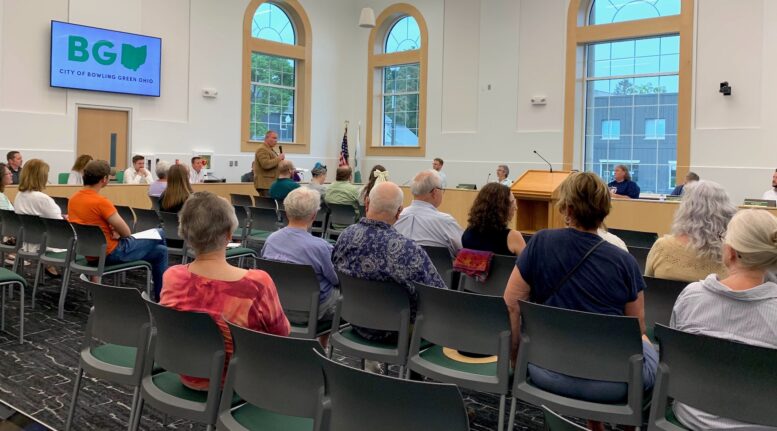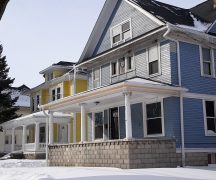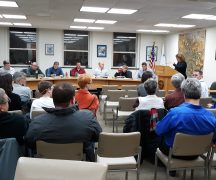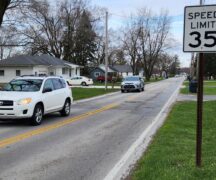BY JULIE CARLE
BG Independent News
As Bowling Green City Council prepares to move forward with additional zoning code legislation, several citizens shared their concerns at Monday night’s council meeting.
The most recently introduced zoning amendment and the zoning code update overall
Katelyn Elliott urged council and the mayor to reject the proposed zoning code amendment that would sunset non-conforming zoning uses after 28 years and affect primarily rental housing properties in the city.
Her concern with the recently introduced amendment is that it will eradicate three- and four-unit dwellings in the city and reduce the diversity of housing available to renters.
“Without this type of housing, I’m not sure my spouse and I would have stayed in Bowling Green,” said Elliott, who is a Bowling Green State University alumna, former renter and “someone who chose to raise a family in BG.”
She added, “There is no place in Bowling Green for people who are not homebuyers or BGSU students.” Elliott also asked the community to reconsider their negative attitudes toward BGSU students and renters.
“It is obvious BGSU students are not viewed as equal members of the community. They are interlopers who should spend money but not be seen or heard of in any other way.
That is until they graduate and then they are expected miraculously to have a good paying job and enough money for a down payment for a single-family home.”
Joseph DeMare reminded council as it had the first reading of zoning changes regarding development, that “what we do here in Bowling Green at the local level affects the global level.”
With global warming contributing to North Pole temperatures above freezing, some of the hottest days ever recently recorded and extremely high sea surface temperature, he said Bowling Green can use local zoning “as a tool, a weapon against global warming.”
Twenty years ago the city was at the forefront in the fight against global warming with its sustainability efforts of installing the wind farm and later building the solar farm, he said. “But we’ve fallen behind now because other communities are talking about 100% renewables.”’
DeMare said the city “can regain the lead.” He doesn’t believe the city needs to reduce taxes on new development. “We are blessed to be one of the safest places in the world in terms of global warming.” The city’s prime location in the center of the continent and the ameliorating effects of the Great Lakes make it a destination for people who are fleeing the extreme weather in other areas of the country.
He recommended including insulation standards, geothermal heating and cooling and omitting natural gas connections on new construction could help. “Don’t rush this process. Take advantage of the opportunity to let Bowling Green regain its position as a truly progressive community,” he said.
Referencing state law and local ordinances, Bowling Green resident David Neuendorf said the plan to have self-certification of rental registrations is a problem. “There’s a temptation for somebody to not be completely truthful, especially when there is no follow up,” he explained.
He is most concerned with fire safety in residences. He suggested the city fire department should do random inspections to verify the safety conditions of smoke detectors, fire alarms and carbon monoxide detectors in homes. As they are in buildings verifying the fire safety, they could also diagram the egresses and the locations of staircases and bedrooms, “which is critical when there is a fire,” Neuendorf said.
“If the City of Bowling Green doesn’t want to direct the fire department to do inspections of rental properties, which I think are the highest priority, you can defer to the state fire marshal. But I ask you to seriously think about it,” he said.
Rose Drain, representing BG Strong, reported her group, in conjunction with the Eastside Association, is working to make Bowling Green “an appealing place to live for current homeowners, renters and for those hoping to buy an affordable home in a caring community.”
She thanked Martha Woelke, community development administrator, for revising the rental resident information to include QR codes for the city’s nuisance reporting system, tenant’s rights and resources. She also thanked council members Rachel Phipps, Joel O’Dorisio, Jeff Dennis and Bill Herald for helping BG Strong and Eastside Association distribute the information sheets to more than 900 residences during BGSU move-in last week.
Debra Sell, representing the local Pickleball Enthusiasts Group, updated council on efforts to install outdoor pickleball courts in Bowling Green. She thanked them for appropriating American Rescue Plan Act (ARPA) funds and said the group continues to fundraise to be able to complete the project.
To date, they have raised $207,000 soliciting funds from industries and corporations, as well as individuals. The Hartung Pickle Company donated $20,000 for the first named court, and Union Bank, Al Green and Thayer Dealerships have also contributed.
The group is hosting a Sept. 16 fundraiser, Pints for Pickleball, at Arlyn’s. She invited council members to attend in support of the initiative. They also are actively pursuing grant funding, including an Ohio Land and Water Conservation grant that is due in November. They are collaborating with Ivan Kovacevis at the BG Community Center. where they have been hosting indoor pickleball games as space allows.
Ben Vollmar, who had previously proposed the ARPA Business Grant fund, renounced his support of the plan “because I object to any use of these funds.”
He thanked the council for their “good-hearted intentions, but please forgive me for having not understood the full context as I do today.”
Vollmar said the ARPA funds come from money that was taken from individuals working in the private sector, “not by voluntary consent but by extortion, commonly referred to as taxation.”
Because there is “no ethical way to distribute stolen loot to select groups or projects,” he said, “the only ethical thing to do, and the only action I support,” is to give the funds back to all the workers and employers in the private sector.
Several resolutions and ordinances were introduced during the meeting, including:
- A resolution establishing and describing the boundaries of the Bowling Green Community Reinvestment Areas East and West and designating a housing officer to administer the program. The resolution is in response to the city’s “need to expand housing” because of a low number of available houses, increasing workforce demands, and feedback from economic development partners that new housing is needed. The city is updating its subdivision regulations to work in tandem with the new zoning code.
- An ordinance to create a victim’s advocate position in the Bowling Green Prosecutor’s Office in response to House Bill 343 which provides victims of crime certain constitutional rights. The law imposes certain responsibilities on prosecutor’s offices across the state. The Bowling Green office handles nearly 8,000 criminal and traffic cases a year, with most of the cases including a victim. To help address the additional responsibilities of a victim advocate, the prosecutor’s office has requested a victim advocate position be created.
- An ordinance authorizing a temporary reduction and/or a moratorium of some residential building permit fees. The fees are related to planning review, inspection fees, and other permits related to construction such as utilities; the moratorium would expire Dec. 31, 2025.
- An ordinance regarding fire damage reduction that allows the city to withhold a percentage of insurance payouts from fire damage for the purpose of cleanup. The funds would allow the city to clean the site if a homeowner chooses not to rebuild after a fire.
- An ordinance in response to changes required by state law, that includes changes to the city’s tax code regarding income taxes. The changes would be effective Dec. 31, 2023.
In other business, the council:
- Approved reappointment of Julie Broadwell to the Bowling Green Planning Commission through May 31, 2029, and appointment of Public Infrastructure Director Brian O’Connell to the Wood County Transportation Improvement District through March 31, 2025. Both appointments are effective immediately.
- Welcomed new Bowling Green City Schools Superintendent Ted Haselman to the city. Mayor Mike Aspacher said they look forward to working with him to support education in Bowling Green.
- Recognized and thanked Joe Fawcett for his dedication as the city’s public service director. He will become the new city administrator in Perrysburg.
- Heard the next council meeting will be held Tuesday, Sept. 5 at 7 p.m. due to the Labor Day holiday on Sept. 4.
- Reported the City Council Strategic Planning Meeting will be held Monday, Sept. 11 at 6 p.m. Depending on the size of the audience, the meeting will either be held in the council chambers or the adjoining meeting room.





